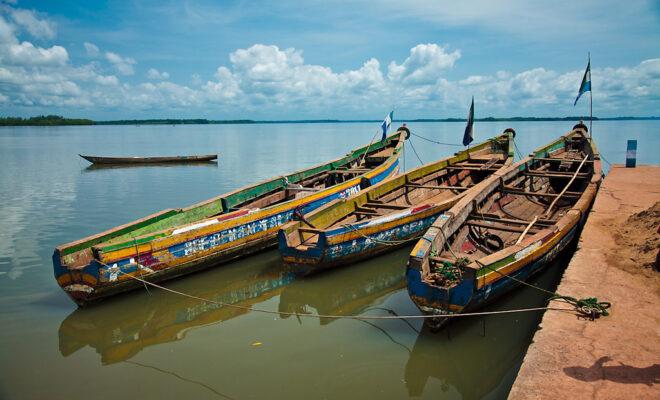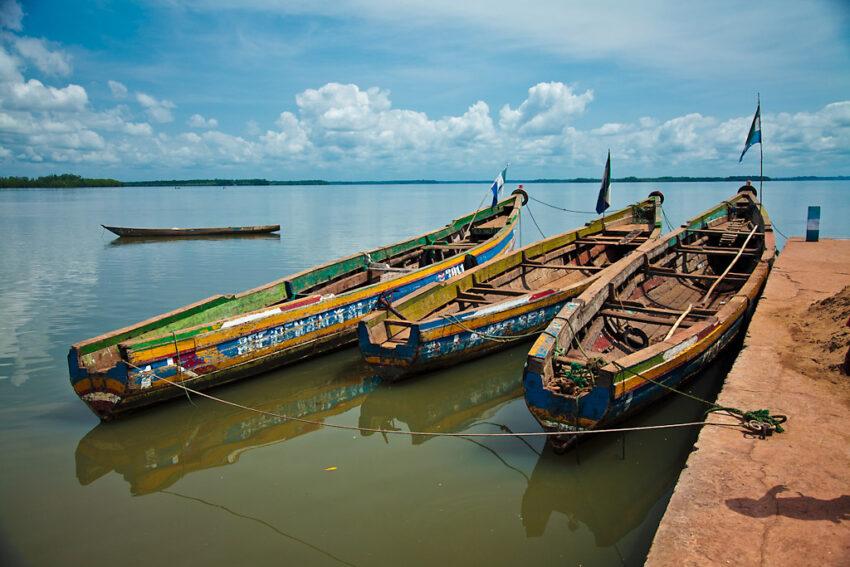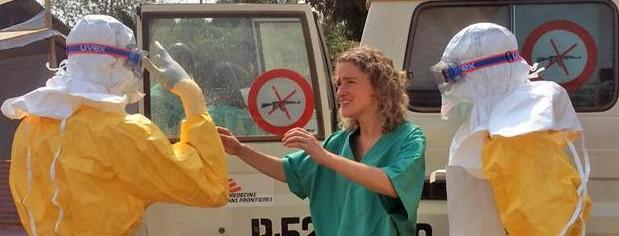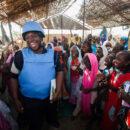Code Red for Africa’s Blue Economy

Coastal and marine resources will be central to the food, energy, and jobs, so long as the right strategies are put in place.

Fishing Boats in Pepel Village, Sierra Leone. Credit: Flickr / bobthemagicdragon.
It is clear to all who want to listen that the planet is facing a climate crisis. As UN Secretary-General António Guterres said in reference to the 2021 Intergovernmental Panel on Climate Change (IPCC) report, this is “a code red for humanity. The alarm bells are deafening and the evidence is irrefutable”.
What is less well known is that the world is also facing an oceans crisis. We have all seen images of cleared forests and large-scale strip mining, but we are much less aware that equally disturbing practices are taking place in the deep seas.
For example, less than half of all key marine biodiversity areas are protected. Ocean dead zones (areas that lack enough oxygen to support marine life) are rising at an alarming rate, from 400 in 2008 to 700 in 2019. And less than 2% of national research budgets are allocated for marine science. Africa is particularly vulnerable. The continent is losing precious mangrove areas, which are vital for marine nurseries. Meanwhile, the cold Benguela Current that provides essential nutrients for Namibia’s fish is at risk of warming up, putting the country’s fishing industry in jeopardy. Many African countries’ fishing sectors are already threatened by illegal, unreported, and unregulated exploitation.
Until recently, the world’s coastal and marine areas have been thought of as limitless resources and places to store our waste. The results have ranged from degraded coastal habitats and marine pollution to overfishing. According to the UN Food and Agriculture Organization (FAO), 57% of the world’s fish stocks are fully exploited and another 30% are over-exploited. This is important as marine fisheries generally contribute $270 billion annually to the world economy, according to the FAO. Clearly, our current uses of “the blue economy” are not sustainable.
Of the 17 UN Sustainable Development Goals, Goal 14 (Life Below Water) is the least funded. Only 0.01% of Official Development Assistance directed toward the SDGs goes toward this goal, and even private investment and funding from philanthropic organisations is grossly inadequate. It is vital that the international community face up to the code red challenges of Africa’s blue economy to scale up the flow of finance towards this challenge and roll out innovative financing schemes such blue bonds and other innovative financing mechanisms.
The blue economy “movement” has been strengthened by the African Union’s (AU) adoption of the 2050 Africa Integrated Maritime Strategy, adopted in 2012, and is being taken forward through the AU’s Africa Blue Economy Strategy, adopted in 2020.
The AU has correctly called the blue economy the “new frontier of the African Renaissance”. This is key as 37 nations in Africa have coasts and 90% of the region’s trade is conducted by sea. Maritime zones under African jurisdiction total over 10 million square km with vast potential for offshore and deep-sea mineral exploitation. Clearly, coastal and marine resources will play essential roles as a source of food, energy, and economic development for the foreseeable future.
The blue economy shows much promise, including finding ways to pursue a low carbon path of economic development that would include creating employment opportunities and reducing poverty. As the World Bank suggests, “the blue economy is the sustainable use of ocean resources for economic growth, improved livelihoods and jobs, and ocean ecosystem health”.
Given the high stakes, it is essential that Africa’s blue economy policies and goals be expanded. Just as sustainable development green initiatives show promise, so too could blue economy projects and activities. It is imperative that all states adopt strategies to achieve enhanced wealth and wellbeing from the oceans in the coming years.
Whether blue economy outcomes will live up to their promise is another matter. There is little doubt that short term gains will be made including from, for example, increased aquaculture and advances in fishing technologies. Yet the long terms sustainability of these endeavours will require concerted effort and significant political will. Finally, as many of the challenges such as marine pollution or maritime security respect no borders, African countries will have to find more ways to boost regional cooperation to find solutions.
The symposium on Africa’s Blue Economy hosted by RAS on 30 March will provide new and innovative ways about looking at Africa’s blue economy and how to change Code Red to Code Blue.






